Related Articles
Related Articles
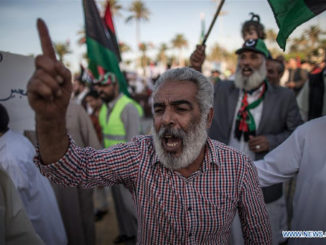
United States Still Strongarming ‘Democracy’ Onto Libya
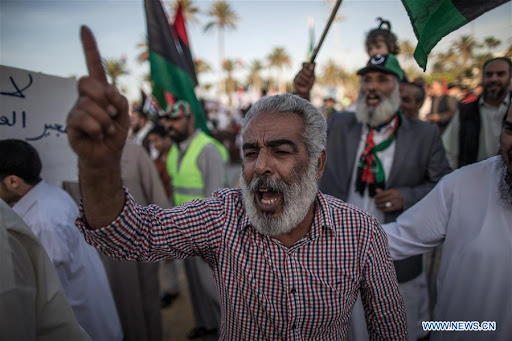
Editor’s Note: The following opinion was first published in Black Agenda Report.
If U.S. imperialism could only be said to be one thing, it is audacious. Recently U.S. rulers have been making a fuss over Russian troops on their own border with Ukraine, while 1,000 U.S. National Guard soldiers were deployed to the Horn of Africa, in countries where the U.S. shares no borders and is actually more than 7,396 miles away.
Ever since its government was destroyed in 2011 in the first operation of the U.S. Africa Command (AFRICOM), Libya has been the quintessential victim of U.S. audacity in Africa. Now, led by the United States, Western officials have been talking up a UN-led peace process in Libya that insists on “inclusive” and “credible” elections starting on December 24, despite serious disputes over how they should be held.
Of course the Libyan people should have the right to decide their leaders, forms of government, and politics. In fact, however, it is extremely difficult to see through the murk created by the inhumanity of the U.S.-EU-NATO axis of domination.
But what sort of process for nominating candidates are the Libyan people able to exercise? How credible and inclusive can an election be that is cast in the midst of a civil war and with the United States presiding over the country’s affairs like a Godfather?
The imperialist structure responsible for leading the overthrow of the Socialist People’s Libyan Arab Jamahiriya , AFRICOM, just backed the election efforts of U.S. Ambassador to Libya Richard Norland. This was after Norland took to Twitter to scold those discrediting the elections saying, “We call on all parties to de-escalate tensions and to respect the Libyan-led, legal, and administrative electoral processes underway.”
For these emissaries of empire, such statements are mere words of formality, empty rhetoric meant to minimize the glare of the contradiction: they created a failed state.
Reports have surfaced about the likely re-emergence of violence which has been on pause during a very fragile ceasefire. There have been stolen voter cards , an allegedly politically motivated disqualification of 25 of the 98 presidential hopefuls by the election commission, a chaotic appeals process, and, of course, a delay in the final list of candidates.
Then there were also the road blocks by gunmen backing eastern military chief and former CIA operative Khalifa Haftar to prevent travel to a court in the southern city of Sebha set to examine the appeal by Saif al-Islam Gaddafi to run for president. It is no surprise that Haftar himself is also a presidential candidate.
Initially Saif al-Islam, son of the murdered Libyan leader Muammar Gaddafi, was being excluded from a bid for presidency by the High Elections Commission. Before a Libyan court ruled on December 2 that Gaddafi can run for president, the case had endured an armed attack on the Sebha Court of Appeals followed by a protest in front of the Sebha Court at the end of November, organized by the people of the city of Ghat against the closure of the court by force.
The protesters, in support of Saif Gaddafi, demanding free and fair elections, and an impartial judiciary said, “…there are those who want to occupy the country and restore colonialism again, and who threaten to divide the country according to the interests of the international powers.”
Black and Brown people of the Global South know full well about what the protesters from Ghat are protesting. The capitalist, white surpremacist order has to disparage people-centered projects and legitimize anything in the interest of racist neoliberalism.
Some of the most transparent and participatory elections in the world, in Nicaragua and Venezuela, are denounced and demonized by the same international powers, its institutional extensions like the OAS, and its corporate media mouthpieces. Beneath that newswire is the irony of a Libya literally destroyed by the same forces. Now, ten years later, it is being forced into a largely illegitimate process.
The title “dictator” is bandied around for all leaders not compliant to Western interests, as was commonly done to the late Muammar Gaddafi. A common sense question one might ask is: Why go through such lengths to prevent the candidacy of the son of a dictator supposedly intent on reestablishing his father’s dynasty?
Once the non-white working class inside the belly of the beast realize that the United States is an undemocratic oligarchy that cannot pretend to offer, to the rest of the world, a nonexistent “democracy,” then it will begin to see that the internationalist fight to support the people of Libya is the same as the domestic fight to liberate those struggling for justice.
Netfa Freeman is an organizer in Pan-African Community Action (PACA) and on the Coordinating Committee of the Black Alliance for Peace. Netfa also is co-host/producer of the WPFW radio show and podcast “Voices With Vision.”
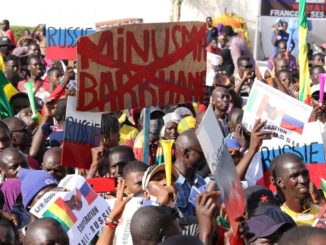
Why Protests Erupted in Mali, With People Demanding France Out and Thanking Russia for Support
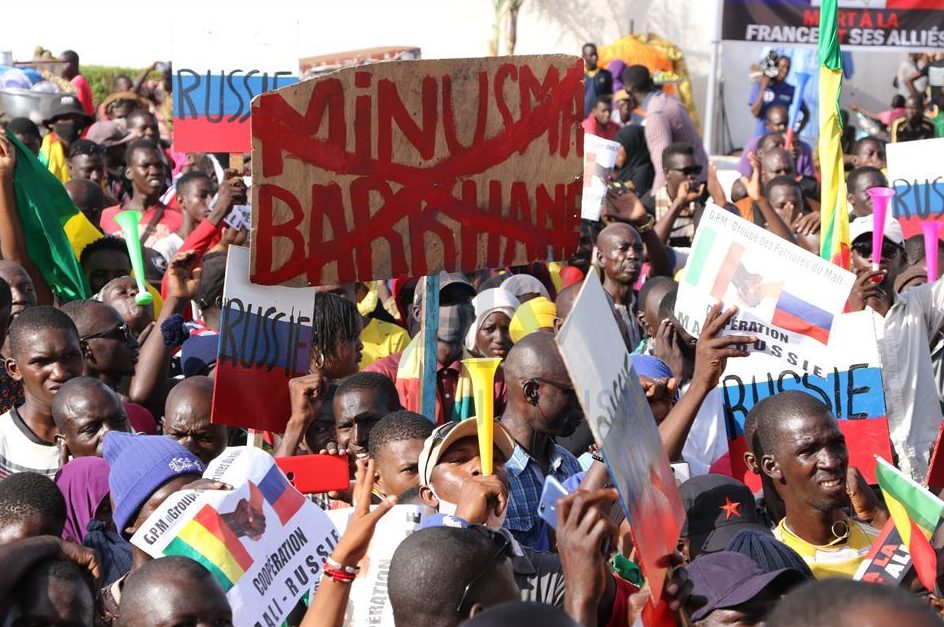
Editor’s Note: The following represents the writer’s analysis.
Thousands of demonstrators took to Mali’s streets on January 14 to demonstrate against sanctions the Economic Community of West African States (ECOWAS) imposed on the country after the military government’s supposed delay in the transitional map (plan) to transfer power to civilians. The military junta called for mobilizations throughout the country. Protests took place in the capital, Bamako. Other cities in the West African country also witnessed demonstrations, the most notable ones being in Timbuktu in the north and Bougouni in the south.
The former transitional president, Bah Andau, called on his compatriots to defend the homeland.
What is the general context in which these popular demonstrations took place? What are the positions of the actors in the crisis? How did international actors react, including France and Russia? And how is their position a reflection of the Malian authorities and the demonstrations?
Election Day Canceled
The beginning of the latest crisis started at the national conference—organized by the transitional government on January 2—which concluded its work in Bamako by adopting a recommendation to extend the political transition map for a period ranging from six months to five years.
The transitional government, led by President Asimie Goïta (also spelled Guetta), had approved an 18-month timetable, from the military coup carried out in August 2020 to elections that are supposed to be held this month.
Then the transitional government retracted that map, claiming the transitional phase needed to be elongated because the country had suffered from terrorist attacks that coincided with the coronavirus pandemic.
The ruling military council justified this change by saying it was unable to meet this month’s deadline, pointing to the continuing instability due to violence, in addition to the need to implement reforms, including that of the constitution. The hope was protests would not take off around the election, as had happened with previous elections.
At the huge protests in Mali, lots of protesters are waving Russian flags and holding posters that say "Mali-Russia cooperation" and "Thank you China and Russia for your support of Mali".
There are also lots of protesters carrying posters that say "Death to France and allies". pic.twitter.com/YPhaP5d0ZA
— Turtle (@swimming_free) January 17, 2022
Unprecedented Cruelty of ECOWAS Sanctions
After the recommendation to elongate the transitional period was issued and submitted to ECOWAS, it decided to hold a double special session of the Conference of the Heads of the West African Economic and Monetary Union. That is where ECOWAS imposed a set of sanctions on January 9, which included:
- closing the borders of ECOWAS member states with Mali,
- imposing a ban on trade (not including the trade of basic materials),
- imposing a ban on financial dealings with Mali,
- freezing Mali’s assets in West African banks, and
- summoning the ambassadors of member states to Bamako.
ECOWAS said the junta’s proposal to hold presidential elections in 2026 is “totally unacceptable” because it “means that an illegitimate transitional military government will hold the Malian people hostage over the next five years.” ECOWAS will only lift sanctions gradually, when Malian authorities present an “acceptable” timetable and when satisfactory progress is observed in its implementation.
These sanctions are more stringent than those imposed after the first coup in August 2020, which prompted observers to accuse the regional organization of unfairly applying economic and political sanctions for goals linked to foreign interests, France in particular. This is pertinent because ECOWAS did not impose the same sanctions on another West African country, Guinea, which witnessed a coup in September.
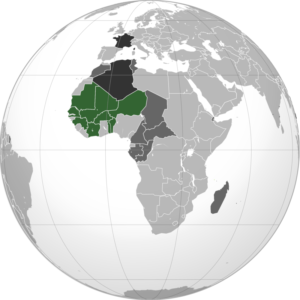
The strong French influence within the corridors of ECOWAS affects the independence of the organization’s decisionmaking. France colonized large portions of West Africa from the 1800s onward. Although West Africa gained independence and was split into sovereign states in the 20th century, France keeps a military presence in the Sahel region of West Africa and mandates many French-speaking African countries use the French currency, the franc, for transactions.
These sanctions would seriously affect the Malian economy, which is among the poorest in the world and has been experiencing a crisis stemming from terrorism and the pandemic. This is especially because the Republic of Mali is landlocked and depends on Senegal and the Ivory Coast to engage in trade. Consequently, these sanctions constitute a tremendous political and economic pressure on the country, exacerbating its worsening problems.
The Transitional Government Reacts
The government in Mali chose two parallel courses.
First, they rejected the sanctions and escalation in a strongly worded statement and recalled its ambassadors from ECOWAS countries, closed its land and air borders with them, and stated it would reserve the right to review its participation within ECOWAS bodies. The ECOWAS stated it did not take the situation in Mali into consideration before imposing sanctions, which Mali considered illegal, and not based on any legal basis regulating the work of the group. The sanctions also contradict ECOWAS’ objectives as an African regional organization aimed at achieving solidarity, and Mali expressed regret that the regional organization had become an “instrument in the hand of forces from outside the region have hidden plans,” an unmistakable reference to France.
Despite the harsh tone, Mali declared the door for dialogue is still open to reach a solution to the aggravating crisis.
The second trend has been to mobilize the street, which is rising in anger at France and its suspicious role in Mali, as well as at ECOWAS and its sanctions that disturb Malians’ lives. Surprisingly, these demonstrations denounced the French presence, and saw the French occupation as grounds for terrorist practices. Protesters declared in their slogans their support for Russia’s directions in support of their country’s cause. During the action, the demonstrators carried posters in which they thanked Russia and its efforts in Mali.
It is no secret the agenda that appeared in the rallies and popular demonstrations is the same as the agenda carried by the Goïta government, which no longer desires the support of the French colonizer. Rather, the government has accused France on more than one occasion of being a major supporter of terrorism in Mali, and therefore saw in the Russian presence a hope and a means that could be relied upon to get the country out of the security quagmire and reduce or end the suspicious French role.
It may be true these demonstrations came out in response to the call of the military, and that they protested against the despised French colonial presence, as well as denounced the penalties of ECOWAS. But it should not be taken for granted that their emergence lends a kind of legitimacy to the double military coup, as well as offers approval and acceptance of the five-year transitional map.
It is undoubtedly a long transitional period, at the end of which may only see an extended military rule, or a false civilian rule that covers for the military rule that holds the wheel of government.
These demonstrations ignited a wave of anger against French colonialism, as the Malian and general African community demonstrated in front of the Malian embassy in Paris, in support of the Malian government’s decision to reject the ECOWAS decisions. January 22 was dedicated to organize demonstrations in front of the French embassies throughout the world.
The World Reacts
The Malian military’s agenda, which the popular demonstrations supported, met with multiple international reactions. For example, French Foreign Minister Jean-Yves Le Drian said France and the Europeans, who are militarily involved in the fight against militants in the region, want to stay in Mali without any conditions.
The French Ambassador to the United Nations, Nicolas de Rivière, affirmed Paris’ full support for ECOWAS’ sanctions because Malian authorities did not respect ECOWAS demands and obligations in terms of a speedy return to the democratic process.
French anger in this context is understandable. It saw the Malian demonstrations and a hostile military that France did not expect and did not want. France fought against such a change in power for decades by passing whoever it deemed to be at its mercy into power, while suppressing and oppressing peoples with a tyrannical, dictatorial rule that hardly allows their voices to be heard.
However, Mali expelled the French ambassador on January 31, giving them 72 hours to leave the country.
As for Russia, it demanded an understanding of the position of the Malian authorities. The Assistant Russian Ambassador to the United Nations, Dmitry Polyansky, called during a meeting of the UN Security Council devoted to West Africa and the Sahel region, to show the necessary respect for the Republic of Mali and its efforts aimed at restoring order in the country, calling for an understanding of the difficulties they face. Without the return of the state’s authority to many regions of the country, it will not be possible to take into account the credibility of the election results, according to Russia.
The Russian position, consistent with the vision of the military government in Mali, rebuffs the Western presence that has begun to recede from Mali. It is a prelude to the expected Russian presence, whether in the form of security companies (Wagner) or direct support by Russian military forces.
These popular demonstrations may constitute the beginning of a real departure for the French colonialist and a decline in its role in West Africa. It may form the nucleus of a popular legitimacy that would constitute a lever for stable rule in the coming days.
Kribsoo Diallo is a Cairo-based Pan-Africanist researcher in political science related to African affairs. He has written for many African magazines and newspapers. Diallo has contributed to translated editions of papers and articles in Arabic and English for several research centers within the African continent.
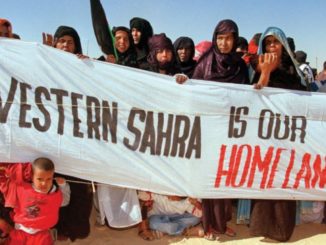
Ahead of UN Session, Sahrawis Recollect Decades of Betrayal That Enabled Moroccan Colonization
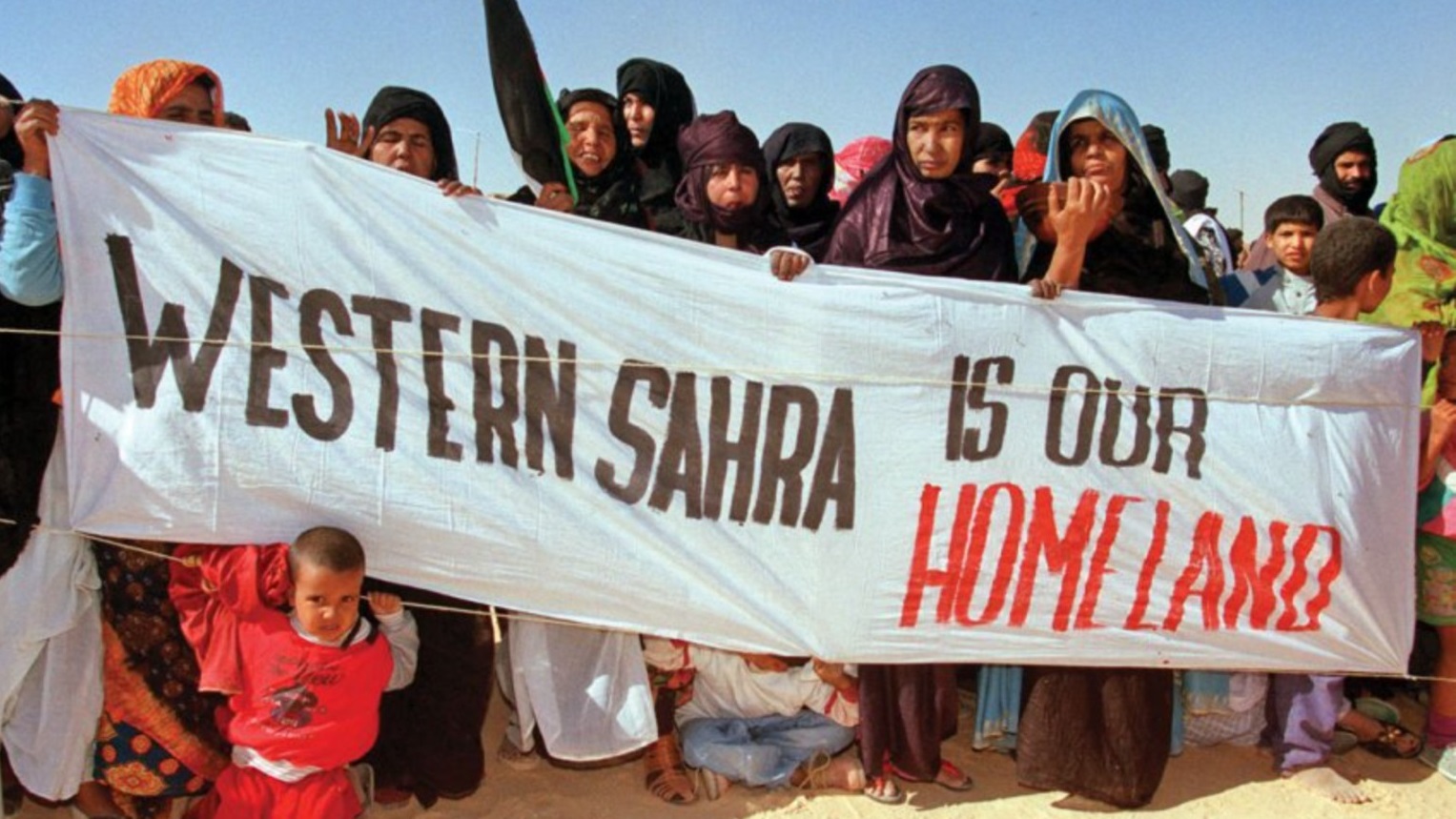
Editor’s Note: The following was originally published in Peoples Dispatch.
Amid the ongoing war for the liberation of Western Sahara from Morocco, which is illegally occupying 80% of its territory, the UN Security Council (UNSC) is reportedly scheduled to discuss the conflict for the second time this month on Monday, October 10. Two more sessions are scheduled for October 17 and 27.
The “Council is expected to renew the mandate of the UN Mission for the Referendum in Western Sahara (MINURSO), which expires on 31 October,” states the UNSC’s monthly forecast for October.
Known officially as the Sahrawi Democratic Republic (SADR), Western Sahara—a founding and full member-state of the African Union (AU)—is Africa’s last colony. It is listed by the UN among the last countries awaiting complete decolonization.
Its former colonizer, Spain, ceded the country to Morocco at the persuasion of the Unite in 1976, despite the fact that the International Court of Justice (ICJ) had dismissed Morocco’s territorial claims. The position supporting the Sahrawi peoples’ right to self-determination has since been upheld by the UN, the AU, the Court of Justice of the European Union (CJEU), and the African Court on Human and Peoples’ Rights (AfCHPR).
MINURSO was established by the UNSC in April 1991 to facilitate the realization of this right by organizing a referendum. In August that year, a ceasefire was secured between the Polisario Front (PF), recognized by the UN as the international representative of the people of Sahrawi, and Morocco.
However, with the backing of the United States and France, Morocco has been able to subvert the organization of this referendum till date. On November 13, 2020, the ceasefire fell apart after 29 years. That day, Moroccan troops crossed the occupied territory into the UN-patrolled buffer zone in the southeastern town of Guerguerat to remove unarmed Sahrawi demonstrators blockading an illegal road that Morocco had built through the territory to Mauritania
“Morocco’s armed incursion was a flagrant violation of the terms of the ceasefire that was declared under UN auspices in 1991,” Kamal Fadel, SADR’s representative to Australia and the Pacific, told Peoples Dispatch. “The Sahrawi army had to react in self-defense and to protect the Sahrawi civilians that were attacked by the Moroccan army.”
Hugh Lovatt and Jacob Mundy, in their policy brief to the European Council on Foreign Relations (ECFR) published in May 2021, observed that “Self-determination for the Sahrawi people appears more remote than when MINURSO was first launched in 1991.” ” With its mandate renewed well over 40 times, the UN “has little to show” for three decades of MINURSO, they said.
“With no power and no support from the UNSC,” MINURSO became “hostage to the Moroccan authorities,” unable even “to report on the human rights situation in the territory, unlike any other UN peace-keeping mission,” Fadel noted.
“We wasted 30 years waiting for MINURSO to deliver the promised referendum. MINURSO’s failure seriously damages the UN’s credibility and encourages authoritarian regimes to defy the international community,” he argued.
While reiterating that “we still believe in a peaceful, just and durable solution under the auspices of the UN,” Fadel maintained that “the UN has to work hard to repair its badly damaged reputation in Western Sahara.”
The position of the UN Secretary General’s former Personal Envoy for Western Sahara was left vacant for more than two years after the resignation of Horst Köhler in May 2019. It was only in October 2021 that Staffan de Mistura was appointed to the post. Mistura, who will be briefing the UNSC member states in the sessions scheduled this month to discuss Western Sahara, is yet to pay a visit to the territory in question. His plan to visit Western Sahara earlier this year was canceled without any reasons stated.
“We hope Mr. Mistura will be able to visit the occupied areas of Western Sahara soon and meet with the Saharawi people freely. It is odd that he has not yet set foot in the territory he is supposed to deal with,” remarked Fadel. Mistura has already met with Foreign Ministers of Morocco and Spain, European officials, and U.S. State Secretary Antony Blinken.
U.S. and European Powers Facilitated Moroccan Occupation of Western Sahara
Western Sahara was colonized by Spain in the early 1880s. Faced with an armed rebellion by the Polisario Front (PF) from 1973, the Spanish government of fascist dictator Francisco Franco agreed in 1974 to hold a referendum. It was an obligation on Spain to fulfill the Sahrawi right to self-determination, in line with the UN’s 1960 Declaration on the Granting of Independence to Colonial Countries.
The neighboring former French colonies of Morocco and Mauritania, eyeing Sahrawi’s mineral wealth and a vast coastline, had already laid claim over the territory since their independence. With about $20 million-worth of weapons supplied by the United States, Morocco began preparation for an armed invasion. Informing the then Spanish Foreign Minister Pedro Cortina about this impending attack in a meeting on October 4, 1975, U.S. State Secretary Henry Kissinger had nudged him to negotiate an agreement with Morocco.
“We are ready to do so.. However, it is important to maintain the form of a referendum on self-determination… Self-determination does not mean independence, although that is one of the options included to give it credibility, but what the people of the area will be called on to do is to show their preference either for Morocco or for Mauritania,” Cortina had responded.
“The problem is the people won’t know what Morocco is, or what Mauritania is,” said Kissinger, with his characteristic cynicism. Cortina corrected him, saying, “Unfortunately, they have learned well from experience what those countries are and they know what all the possibilities are.”
In a subsequent meeting on October 9, Cortina confronted Kissinger about U.S. support for an imminent Moroccan invasion of Sahrawi, then known as Spanish Sahara. He was told that if Spain failed to reach an agreement with Morocco, “it’s not an American concern.” In effect, Kissinger had told Cortina that if Moroccan forces invaded Spanish Sahara using American weapons, the United States would not intervene to stop it.
“We have no particular view about the future of the Spanish Sahara,” Kissinger elaborated on the U.S. position. “I told you privately that… the future of Spanish Sahara doesn’t seem particularly great. I feel the same way about Guinea-Bissau, or Upper Volta. The world can survive without a Spanish Sahara; it won’t be among the countries making a great contribution. There was a period in my life when I didn’t know where the Spanish Sahara was, and I was as happy as I am today.”
“Before phosphates were discovered,” Cortina exclaimed. He was referring to the large deposits found in the territory. Phosphates are the main mineral needed to make fertilizers, of which Morocco went on to become one of the world’s largest producers.
On securing guarantees on access to phosphate and fishing rights, the Spanish government – which had by then also realized that it would not be able to install a puppet Sahrawi elite under Spanish control in power after independence – signed the Madrid Accords. With this treaty, signed on November 14, 1975, only days before the death of Franco who had already slipped into coma, Spain ceded its colony to Morocco and Mauritania.
‘No Tie of Territorial Sovereignty’: ICJ
The UN does not recognize this treaty, which had disregarded the advisory opinion given by the International Court of Justice (ICJ). The advisory opinion was given on the request of the UN General Assembly only a month before, on October 16, 1975. The ICJ, which had also been approached by Morocco, stated that “the materials and information presented.. do not establish any tie of territorial sovereignty between the territory of Western Sahara and the Kingdom of Morocco or the Mauritanian entity.”
However, the United States and its Western allies calculated that an independent Western Sahara under the rule of PF, supported by Algeria which was perceived as inclined toward the Soviet Union, would be against their Cold War interests. And so, the aspirations of the Sahrawi people to realize their internationally recognized right to self-determination, which was pitied as ‘unfortunate’ by the Spanish foreign minister at the time, was trampled over for imperial interests.
By the start of 1976, Moroccan forces occupied the western coastal region of Sahrawi, while Mauritanian forces took over the eastern interior region, forcing 40% of the Sahrawi population to flee to Algeria, where they continue to reside in refugee camps in the border town of Tindouf.
Guerrillas of the PF fought back, quickly regaining the eastern territory from Mauritania, which made peace with SADR and withdrew all its claims by 1979. However, “[b]acked by France and the United States, and financed by Saudi Arabia, Morocco’s armed forces eventually countered Polisario by building a heavily mined and patrolled 2,700-kilometer berm,” Lovatt and Mundy recount in their policy brief to ECFR.
Constructed with the help of U.S. companies Northrop and Westinghouse, the berm is the second longest wall in the world, reinforced with the world’s longest minefield consisting of about seven million landmines. It is among the largest military infrastructures on earth.
Although the Moroccan forces managed to bring about a stalemate by the 1980s with the completion of the construction of the berm, PF’s forces continued to antagonize their positions along the wall. By the time the ceasefire was agreed upon in 1991 following the establishment of MINURSO with a mandate to conduct a referendum, over a thousand enforced disappearances had been reported from the territory under Moroccan occupation. Yet, the protests were unrelenting.
In the meantime, SADR’s cause was gaining increasing support. In 1980, the UN General Assembly (UNGA) recognized the PF as the international representative of Western Sahara. In 1984, after SADR was welcomed as a member of the Organization of African Unity (OAU), the precursor to the African Union (AU), Morocco quit the organization in protest.
Three years later, Morocco applied for membership of the European Communities, which later evolved into the European Union (EU). However, not considered a European country, Morocco’s application was turned down. It was only in 2017 that Morocco joined the AU, to which it was admitted without recognition of any territorial rights over SADR, which is a founding and full member-state of the AU.
In this context of the increasing isolation it faced in the 1990s over its occupation of SADR – except for the backing of the United States, France and Spain – Morocco agreed to hold a referendum, and eventually signed the Houston Agreement with the PF in 1997. This remains till date the only agreement signed between the two. Voter lists were then prepared by MINURSO, and SADR seemed to be on the verge of holding the long-due referendum to realize its decolonization in accordance with the UN Declaration of 1960.
However, more concerned about the stability of the Moroccan monarchy—whose throne had passed from King Hassan II after his death in 1999 to his son Mohammed VI—the United States and France nudged the new King to renege on the Houston agreement, Lovatt and Mundy recount.
The United States’ facade of neutrality on the Sahrawi issue and support for the UN Declaration on decolonization—even while antagonizing the Sahrawi liberation struggle all these decades—was officially removed on December 10, 2020.
The White House, under Donald Trump’s presidency, announced that day that “the United States recognizes Moroccan sovereignty over the entire Western Sahara territory.” Arguing that “an independent Sahrawi State is not a realistic option for resolving the conflict” the United States declared that autonomy under Moroccan sovereignty is “the only basis for a just and lasting solution to the dispute.”
Less than two years later, Spain, which had reversed its position in the 2000s after facing considerable international shame over its handing over of Sahrawi to Morocco, did another volte face, yielding again to the latter’s claims to sovereignty over its former colony in March 2022.
EU and UK Are Invested in Morocco’s Occupation of Western Sahara
This decision of Spain was quickly welcomed by the EU. Its Foreign Policy Chief Josep Borrell’s spokesperson remarked that stronger bilateral relations between any of its member-states and Morocco “can only be beneficial for the implementation of the Euro-Moroccan partnership.”
94% of the fisheries caught by the European fleets from 2014-18 under this “partnership” with Morocco was from Sahrawi waters. When the Court of Justice of the European Union (CJEU) ruled in 2018 that the fisheries agreement with Morocco cannot extend to Sahrawi waters over which Morocco had no sovereignty, the EU simply renegotiated the agreement specifying the inclusion of Sahrawi territory.
A total of 124,000 tonnes of fishery, worth EUR 447 million, was extracted by Europe from Sahrawi waters in 2019, and another 140,500 tonnes, valued EUR 412 million, in 2020. Ruling on Polisario’s challenge to this continuation of European fishing under a new agreement, the General Court of the European Union annulled the same in September 2021.
The European Commission appealed this decision of the court in December 2021. In March 2022, the European Commissioner for the Environment, Oceans, and Fisheries, Virginijus Sinkervicius reiterated in a response to a question in the EU parliament that “the Commission confirms its commitment to the EU-Morocco Fisheries Partnership Agreement.”
Fadel said that the “EU fishing fleets are still finding ways to continue the illegal fishing in the Sahrawi waters with the complicity of the occupying power.”
The United Kingdom High Court of Justice (UKHCJ) had also upheld CJEU’s reasoning in 2019 while ruling in favor of the Western Sahara Campaign UK (WSCUK). The court ruled that the WSCUK “has been completely successful in its litigation” that the preferential treatment given by UK’s Revenue and Customs Service to goods coming from Western Sahara under the EU’s agreement with Morocco went against the international law. The court also concluded the same about the Department for Environment, Food and Rural Affairs’ granting quotas to British vessels fishing in Sahrawi waters.
On October 5, 2022, the High Court held the first hearing of the WSCUK’s case against the Department for International Trade and the Treasury over the UK-Morocco Association Agreement (UKMAA), which was signed in October 2019 post-Brexit.
Three of the five permanent seats with veto power in the UNSC are held by the United States, UK and France, all of which have worked against the Sahrawi liberation struggle. Under the watch of the UNSC, “self-determination and decolonization were replaced with a peace process that has given Morocco veto power over how the Sahrawi people fulfill their internationally recognized rights,” observed Lovatt and Mundy.
“We can only ask the UNSC to stop its pretense about human rights and democracy; to stop its hypocrisy,” Hamza Lakhal, a dissident Arabic poet from Laayoune, the largest city in occupied territory, told Peoples Dispatch. “They will move NATO for Ukraine because they hate Russia, but occupation of Western Sahara against all international laws and resolutions is okay because the occupying power here is a friend.”
‘A Collective Shame’
Morocco’s ‘friendship’ with the West has not necessarily won support for its occupation from fellow African countries. Its attempt to get Kenya’s new President William Ruto to withdraw the country’s decade-long support to the Sahrawi cause and endorse Moroccan claims of sovereignty over the occupied territory back-fired last month, embarrassing both Ruto and Morocco’s foreign ministry.
Subsequently, when it raised issue with South Sudan’s decision to resume diplomatic relations with SADR on September 20, Morocco was put down in a statement by the former’s foreign ministry, simply clarifying that it will not take a position contradicting that of the AU and UN.
In a judgment on the same day, the African Court on Human and Peoples’ Rights reiterated that “both the UN and the AU recognize the situation of SADR as one of occupation and consider its territory as one of those territories whose decolonization process is not yet fully complete.”
Stating that “although Morocco has always laid claim on the territory it occupies, its assertion has never been accepted by the international community,” the court reiterated the ICJ’s 1975 advisory opinion.
Describing Sahrawis’ right to self determination as “inalienable, non-negotiable, and not subject to statutory limitations,” Algeria’s Foreign Minister Ramtane Lamamra, in his address to UNGA on September 27, called on the UN “to assume their legal responsibilities towards the Sahrawi people.”
The UN-promised “organization of a free and fair referendum in order to enable these courageous people… to decide on their political future cannot forever be taken hostage by the intransigence of an occupying state, which has failed several times with regards to its international obligations,” he said.
Namibian President Hage Geingob said in his address to the UNGA that the “lack of progress in implementing UN resolutions to resolve the question of Western Sahara should be something we must all have a collective shame for.”
